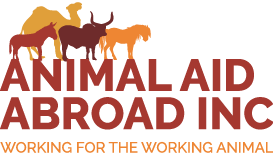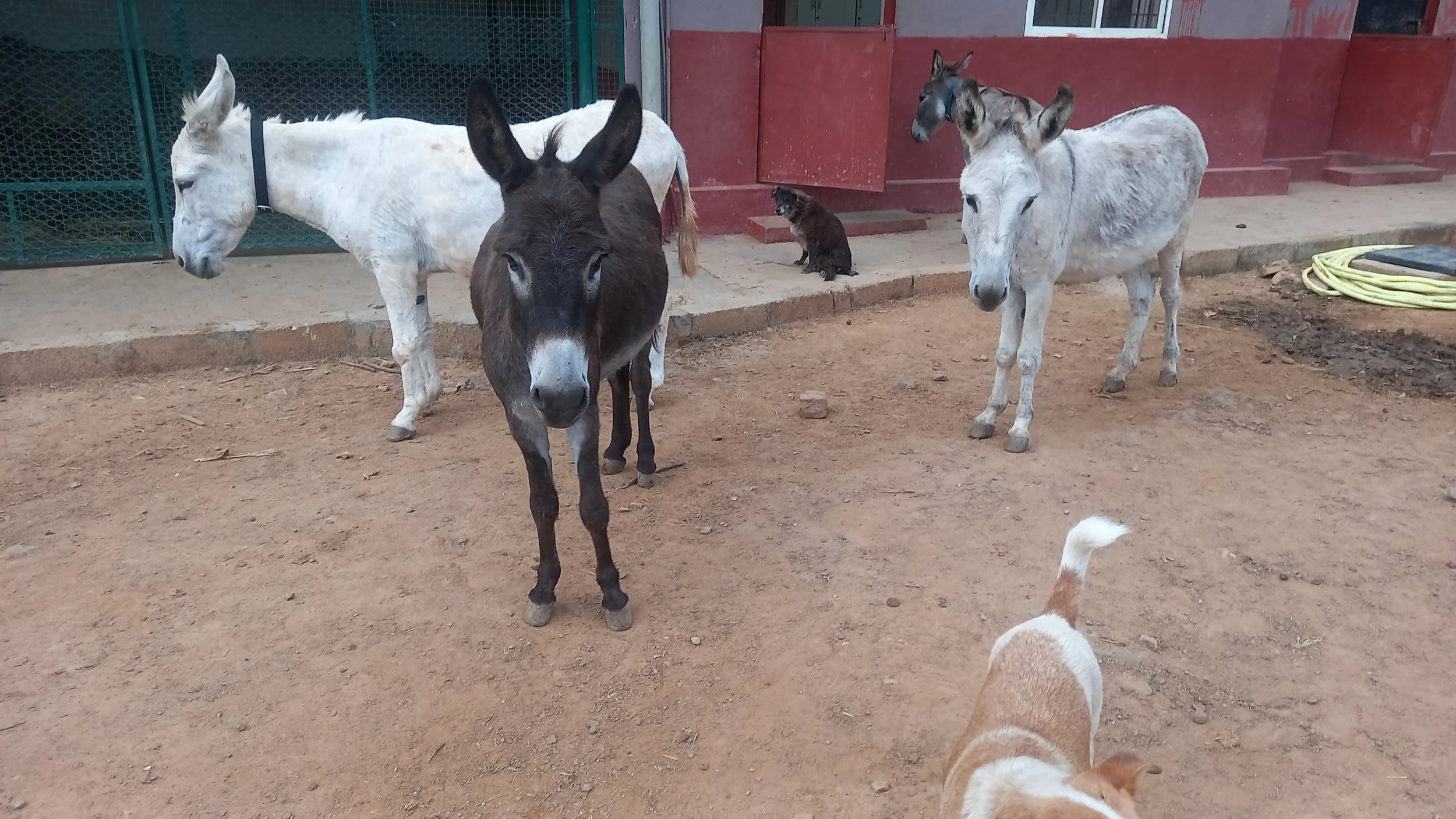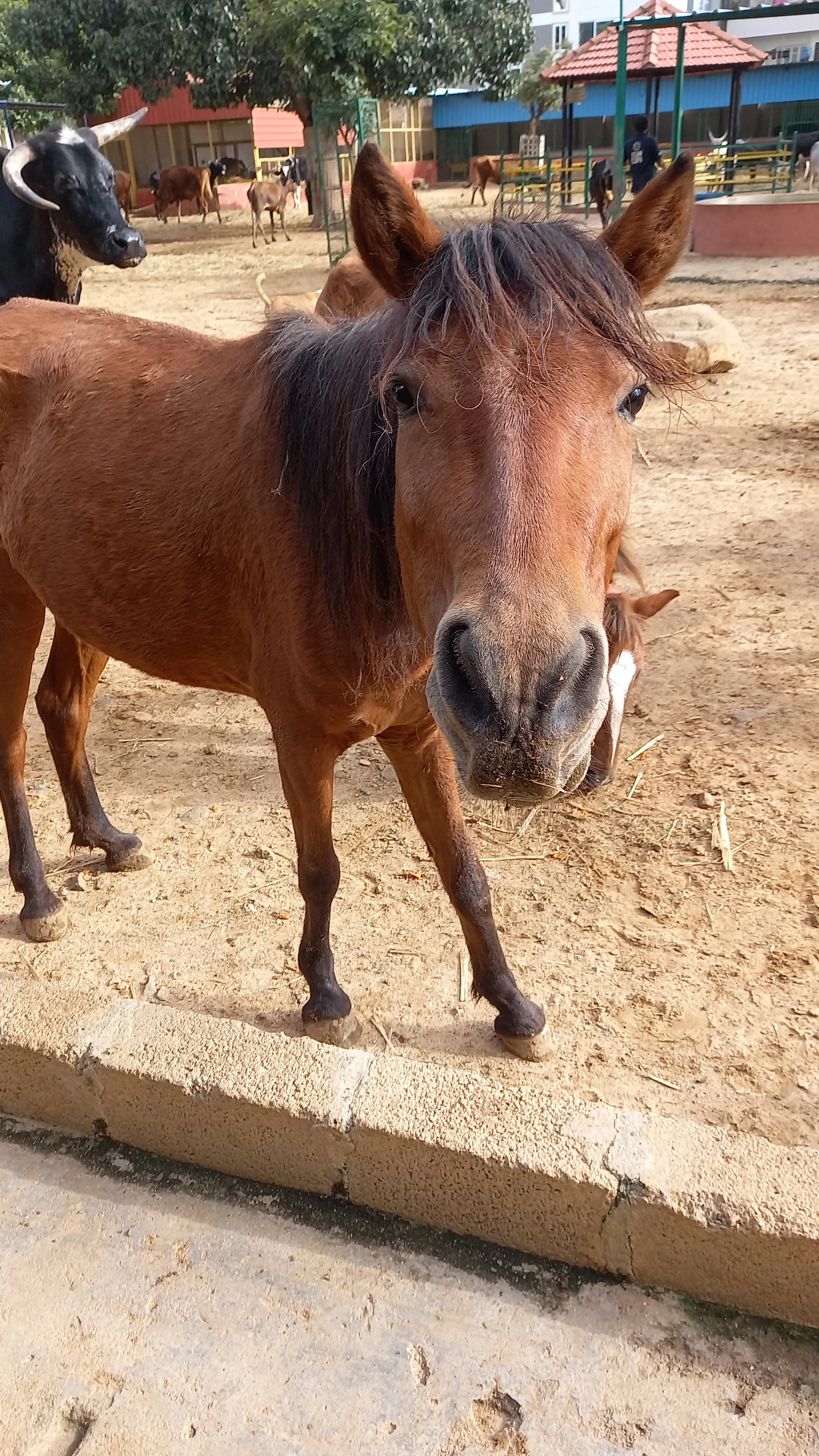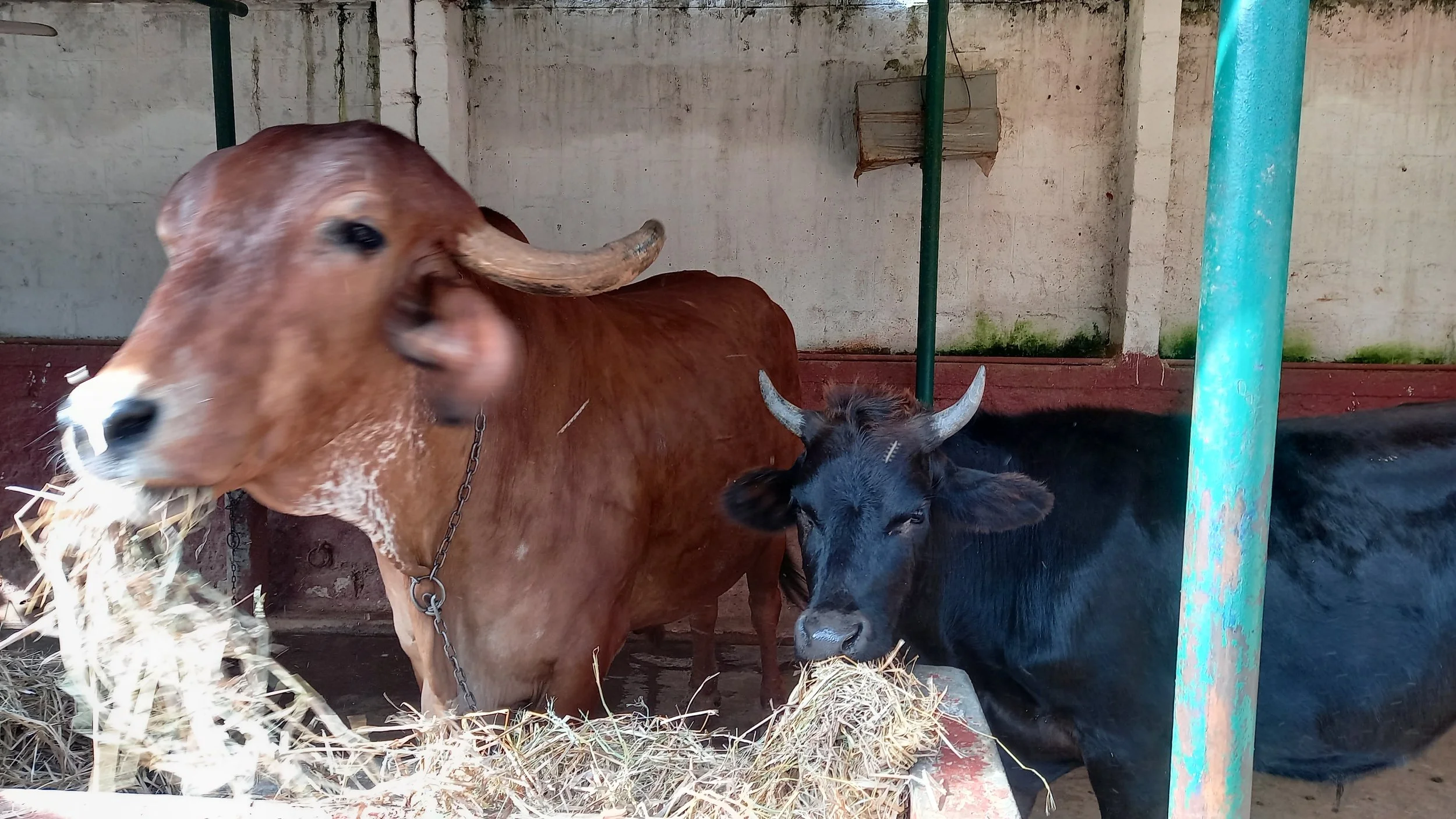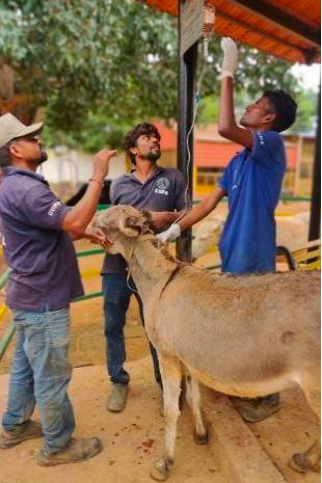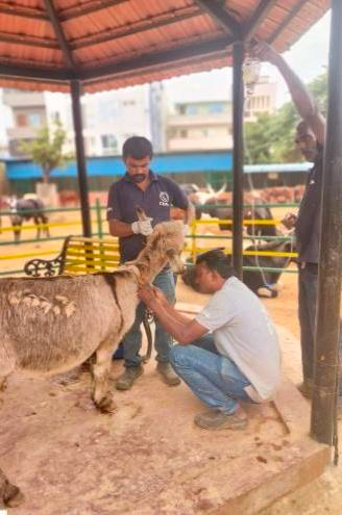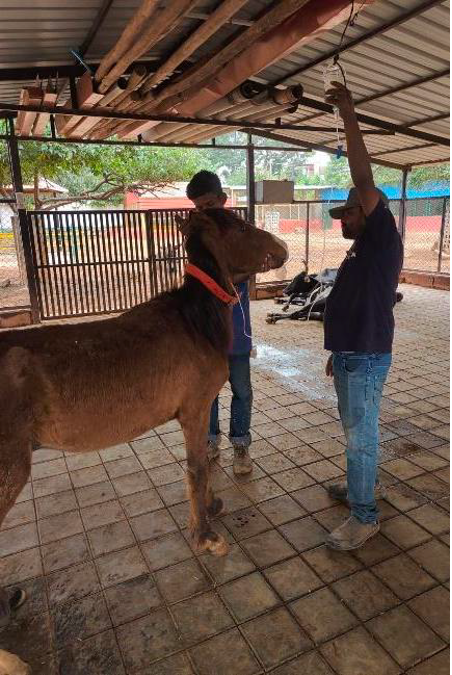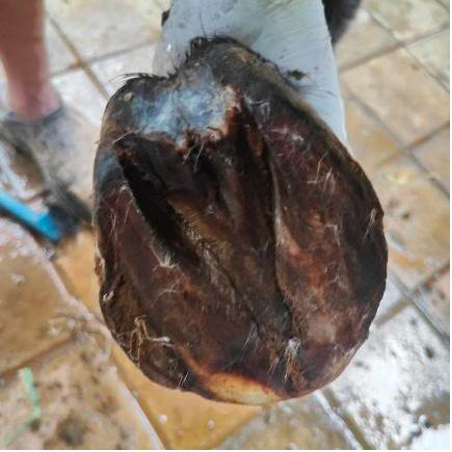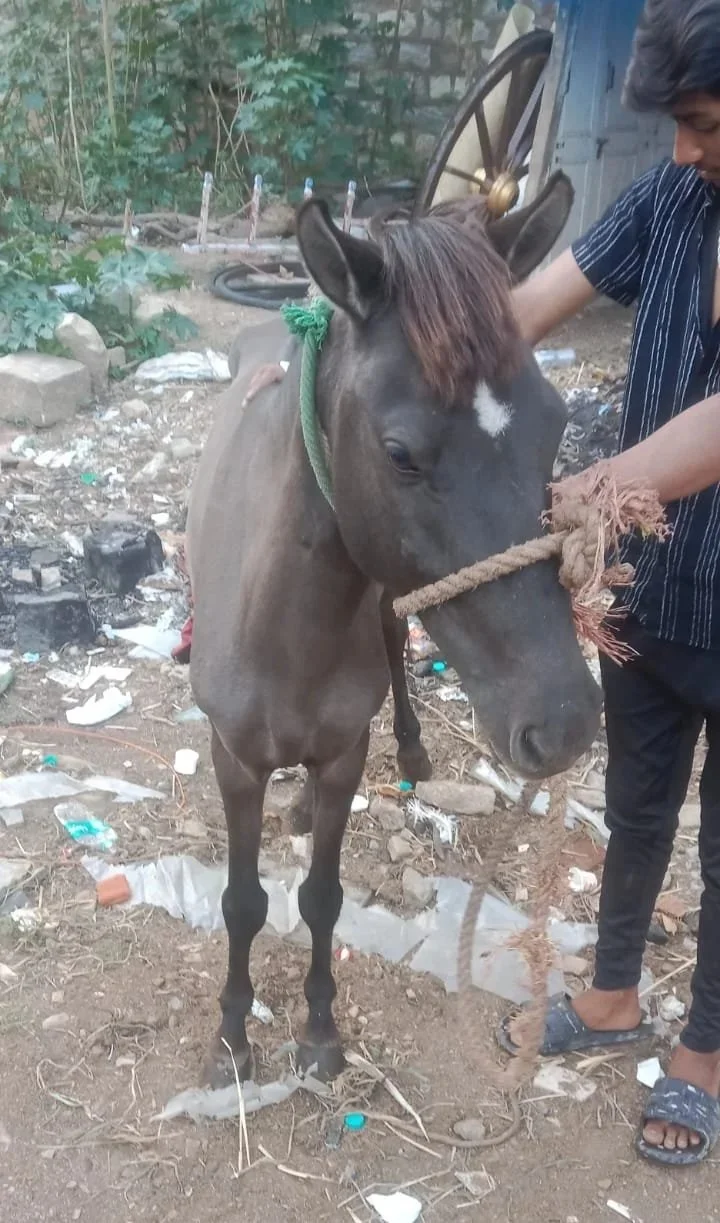Improving Wellbeing and Dignity for Working Animals in Bengaluru
Compassion Unlimited Plus Action (CUPA) are currently caring for over 120 rescued working animals at their sanctuary in Bengaluru, India.
Due to your brilliant support, they are also spreading kindness and teaching respect to improve the lives of all working animals in their community.
Project Introduction: CUPA Large Animal Rescue & Rehabilitation Initiative
Since 2012, CUPA's Large Animal Rescue & Rehabilitation Center (LARRC) has served as a sanctuary for large working animals such as cows, bullocks, ponies, donkeys, and horses rescued from neglect, abandonment or harsh working conditions. The centre currently provides a safe and nurturing environment for over 120 such animals, focusing on long-term rehabilitation and care.
This project aims to enhance the health and welfare of working and draught animals in Bengaluru, both within CUPA shelters and in the field through organized health camps and consistent nutritional support. The initiative targets ponies, donkeys and bullocks who continue to play a vital role in transport and agriculture, especially in semi-urban and rural communities.
Among these are Tonga ponies - small yet resilient animals traditionally used to pull tongas (two-wheeled carriages). Despite their importance in affordable local transport, many suffer from poor nutrition and untreated health issues due to the limited means of their owners. Similarly, bullocks - often employed in agriculture and for transporting goods - face comparable neglect, particularly in the face of urbanization and modernization, which has led to a decline in the use of traditional transport methods.
Recognizing the continued reliance on these animals in certain communities, this project focuses on delivering targeted healthcare interventions and nutrition support to approximately 250 to 300 animals over an 11-month period. By combining shelter-based rehabilitation with community outreach through health camps, the initiative seeks to significantly improve the quality of life for Bengaluru's remaining working and draught animals.
Project Objectives
● Support for Animals Affected by Trauma: The initiative focuses on animals who have been victims of road accidents or cruelty, as well as those living with physical disabilities. Each case is approached with urgency and compassion to ensure timely intervention.
● Comprehensive Medical and Rehabilitative Care: Once rescued, animals receive thorough veterinary care and ongoing medical treatment. CUPA also ensures that animals requiring extended care have access to long-term shelter and supervision.
● Enhancing Animal Welfare and Quality of Life: The program aims not only to treat injuries and illnesses but also to improve the overall well-being and dignity of rescued animals, allowing them to live in a safe, nurturing environment.
● Raising Community Awareness and Compassion: By sharing these stories and engaging with the public, CUPA promotes greater awareness of animal welfare issues and encourages compassion and responsible behavior towards animals, especially those who are often overlooked.
● Rescue and Rehabilitate Large Working Animals: CUPA is committed to rescuing large working animals such as cows, bulls, horses, donkeys, and buffaloes, many of whom have been subjected to neglect, harsh working conditions or abandonment.
Rehabilitation and Daily Care of Rescued Large Animals
CUPA LARRC currently houses 38 bullocks, 13 ponies and 8 donkeys who are undergoing various stages of rehabilitation after being rescued from neglect or abuse. Ongoing activities include providing medical attention, nutritious food, dietary supplements and regular monitoring. Weak or injured animals receive focused care, ensuring their recovery and long-term well-being.
All animals, especially those in weaker condition, are kept under continuous veterinary observation. Regular health checks and timely medication are administered. This proactive approach helps identify issues early, manage chronic conditions and promote steady recovery.
Case Studies
Donkeys: Currently 8 at LARRC Centre
Issue: Anaemic conditions
Causes: Age-related + earlier nutritional issues
Treatment details: Twice a week treatment of Erythropoietin and amino acids supplement.
Working ponies: Currently 13 at LARRC Center
Issue: Negligence, lameness and nutritional issues
Causes: Negligence and accidents
Treatment details: Twice a week treatment of Erythropoietin and amino acids supplement, in addition to nutritional supplements.
Working bullocks: Currently 38 at shelter
Issue: Wounds from injuries and fractures
Causes: Accidents and negligence by owners
Treatment details:
Medical treatment determined on the case – most include antibiotics, providing supplements, and other treatment for their well-being.
The cases illustrated here are of two bullocks who have horn injuries.
Hoof Health Management for Ponies and Donkeys
Special attention is given to hoof care - an essential part of equine health. Regular hoof cleaning, trimming and treatments are provided, especially for the ponies and donkeys. The images below show the improvements in hoof condition after intervention, ensuring mobility and comfort.
Case Study: Working Pony
Issue: Aftercare following the pony’s laminitis
Causes: Negligent treatment by the previous owner
Treatment details: A pony called Asghar came to LARRC with recurrent lameness. On inspection, it was noticed that Asghar had recurring incidents of laminitis. He is now under constant medical care, and nutritional benefits have been added to aid in his recovery.
Treatment for Injured Working Bullocks
Outdoor spot treatments are given to working bullocks who are injured due to accidents. Most of these bullocks are let loose by farmers or abandoned by them.
Case Study: Working Bullocks
Issue: Wounds from injuries
Causes: Accidents and negligence from owners
Treatment details: Spot treatments include treating the working bullock on the spot and ensuring a quick recovery.
Outreach Program for Working Ponies – Medical Camps and Nutrition Support
This was the second such camp held and included a significant number of working ponies and donkeys, particularly those used in "Tonga" transportation systems across Bangalore. These ponies suffer from chronic neglect, undernourishment and physical exhaustion. These animals are essential to the livelihoods of their owners, yet often receive inadequate veterinary care and poor-quality nutrition, leading to a range of health issues including fatigue, muscle weakness, digestive disorders and hoof problems.
Key highlights:
On 27 September, 2025, CUPA organized the second outreach program for working ponies, targeting areas where Tonga operators are commonly found. The initiative focused on both immediate relief and long-term support.
Services provided:
Deworming: All 54 ponies received full deworming treatment to address parasitic infestations, which are common and contribute to weight loss, lethargy and lowered immunity.
Medical Checkups: Each animal underwent a basic veterinary examination, including evaluation of body condition, vital signs, hoof health, and visible signs of distress or injury.
Nutrition Support: Specially formulated nutrient-rich feed and supplements were distributed to owners. These included mineral and vitamin mixes designed to:
➢ Improve energy levels
➢ Enhance digestion
➢ Support joint and bone health
➢ Promote recovery in underweight or weak animals
Community feedback and early impact:
Post-intervention feedback from pony owners has been overwhelmingly positive.
Many owners reported visible improvements in energy, appetite, and endurance.
Animals previously noted to be lethargic or showing signs of fatigue were observed to be more active and responsive.
Some ponies with digestive discomfort or dull coats showed signs of healthier digestion and coat shine, indicating improved internal health.
This strong response has validated our assumption that basic, preventive care can create a significant improvement in the lives of working equines.
Thank you for having a heart for working animals. With your generous ongoing support, we are increasing compassion, care and respect for so many animals around the world.
